- Home
- Julie Smith
Louisiana Hotshot Page 8
Louisiana Hotshot Read online
Page 8
Millie sneered. “And big in the role-model business. Tell me something— does a rapper need hats? Does he need funky, floppy hats, and fancy pimp-style hats, and little bitty pillbox hats with sequin pictures on them? Think he might need a whole wardrobe of hats? Well, where would he come?”
Talba smiled. “Pretty good customer to have.”
“Oh, yeah. Great customer. I’ve got this designer named Danielle, who does these incredible sequin things—”
“I’ve got one of her hats. You mean the Baron and I have something in common?”
“He just loves Danielle. Commissions stuff from her.”
“What’s the deal— is Tujague TNT?”
“Half of it— T and T, I said. That’s what they call themselves, The other one’s a creep named Toes.”
Talba almost gasped aloud.
“Look, I haven’t got anything against Tujague, except maybe he’s a little arrogant, but, hell, if Tom Cruise came in here, would he be arrogant? He’s a movie star. Of course, Meryl Streep wasn’t arrogant— man, does she look good in hats. But mostly, stars believe their own press.” She shrugged, and it was a little like an earthquake. “It’s a fact of life. For one thing, they have these entourages.” The last word was delivered with such contempt you’d have thought she was a born-again with a thing against sinners.
“Ah,” said Talba. “Toes.”
“Oh, yeah, Toes. The motherfucker. Excuse my French.”
What was it with white people and this French thing? Talba said, “Hey, it’s the French Quarter.”
Millie looked at her, probably actually taking in her face for the first time. “You’re pretty funny. And you look… I don’t know, like a performer. I get ‘em in here, you know? Show me that license again?”
“I am a performer— this is my day job, okay?” She pulled herself tall and declaimed. “By day, a simple private eye, and by night, the Baroness de Pontalba.” She bowed.
“Cool. I knew it. You a rapper too?”
“Talba’s my name; poetry’s my game. I don’t hang in TNT circles, believe me.” She handed over the license, but this time Millie didn’t even look at it.
Millie sighed. “Well, the long and short of it is, poor little Rhonda didn’t have any better sense than to fall for him. You really didn’t know her?”
She pointed to a picture taped to the cash register, of staff members clowning. “Well, this is what she looked like, not—” she shuddered “— nothing like whatever that was in the casket.”
She wasn’t quite so thin in the picture; she was a beautiful, vital girl, wearing a vintage dress and a hat. “She looks like a princess.”
“She was one of the prettiest girls I ever saw. And Toes— shit. Toad’s more like it. Skinny, ugly little creep. Kind of a monkey face. But it was like… I don’t know… I guess she thought he somehow was Tujague even though he’s probably some penny-ante little dealer or something. I don’t know what he is, and neither did Rhonda, even though she dated him off and on for three months.” She paused and got dreamy. “Three months. Is that all it takes to ruin a life? Hah! Dated. Did I say dated? She didn’t date him, she was his slave. He said rabbit, she hopped. She talked to a man, even a customer, he beat her up. He’d come by and get her, take her away for an hour, screw her, bring her back with her dress torn. God, she was a mess.”
“Why do you think he killed her?”
Millie looked at her accusingly. “You’re the one who said it. I didn’t.”
“I think I just said a crime. Seriously— why do you think he killed her?”
“Come on— why do you think so?”
This is going nowhere, Talba thought. “Who is Toes, exactly? Doesn’t he have a name?”
Millie shrugged. “Not that I know of.”
“Do you know his address or phone number? Any way at all I can reach him?”
“No. He’s a friend of Tujague’s, but I hear the Baron’s a little hard to get to. Being a jillionaire and all.”
“Well, I know a few hundred people who can get to him. And they’ve all got blue uniforms.”
Millie looked startled. Her smile, when it came, started out slow and spread over her face. “I kind of like that idea.”
Talba wasn’t sure Eddie would, but she wasn’t about to call him at home. The ethics of it seemed simple: she had information that could lead quickly to the rapist’s arrest— but only if the police were involved. She could spend days running down pals of the Baron. The cops could just turn up and ask him who Toes was; if he didn’t answer, they could make him miserable, at least for a few hours. She and Eddie couldn’t compete with that.
She knew one cop in the whole department, and it happened to be a detective who’d worked Homicide for years. She went back to her office and put in a call to the Third District. “Skip Langdon, please.”
Langdon came on the line. “Baronessa. How the hell have you been?”
“I was doing great till Miz Clara made me get a job.”
Langdon was a big strong white woman with hair so thick and curly it was almost nappy. She laughed, and Talba could picture brown curls shaking all over her head. “Tough luck. You making those computers smoke?”
“I’m working for a private detective.”
“Oh, God, some people never learn. Remember what happened to the last one you worked for?”
“This guy’s a different animal. You know Eddie Valentino?”
“Sure. Everybody knows Eddie. Now, he’s a good guy. But I don’t see why someone with your skills…”
“Miz Clara’s sentiments exactly. Call it the thrill of the chase. Would you know anything about that?”
“Oh.” The cop’s voice was subdued. “That’s a nasty bug to have bite you. You’re going to be poor for the rest of your life.”
It was Talba’s turn to laugh. “I doubt it. I’m probably going to get fired for calling you. But I think at this point I might be obligated to.”
“I’m all ears.”
Talba ran it down for her, pausing for interruptions of “Jesus!” and “What a turd.”
When she had finished, Langdon said, “Well, you did the right thing, assuming the person handling the case is a halfway-decent cop. But could I give you some unsolicited advice?”
“Sure. What?”
“Keep working the case.”
“Meaning?”
“Meaning don’t count on anything. The Baron’s got a lot of pull in this town.”
“In the department?” Talba was shocked.
“About six months ago, a couple of baby rappers got into some trouble over a few guns and a little rock. It was kind of strange how easily they walked away from it. Guess whose label they record on?”
“Ah. I guess I shouldn’t be surprised. This was still Louisiana the last time I looked.”
“Let me find out whose case it is— in Child Abuse, I mean— and they can call you if that’s okay.”
“Sure.”
“The Homicide thing’s a little more delicate. I think I’ll just say I got a tip that it might involve a carnal knowledge case— give the detective the name of the Juvenile officer, and let him or her run with it. That way you don’t have to get involved. Okay by you?”
“Couldn’t be better.”
She spent the rest of the day calling people whose names she’d gotten from the funeral registry, but none would admit to knowing a Toes— or any black friend of Rhonda’s.
And by the end of the day, no call had come from the Juvenile Department.
Chapter 8
“A man named Toes. What’s wrong with girls these days?” Darryl Boucree was grinning at her across the table at Bywater Bar-B-Que, which, despite its old-fashioned name, was the kind of place decorated with Barbies in birdcages.
Across from Darryl was a good place to be. That way you could look at him. He had to be the best-looking history teacher in the parish. Talba had no idea how he kept the Fortier girls at bay.
He was a little bit scho
larly-looking, which befitted his day job, and a little bit devilish, which was more appropriate for his two night gigs, bartending and playing the trumpet. He was a sometime member of a band called the Boucree Brothers, which was more or less a pickup band made up of family members, not all of them brothers. Darryl was someone’s nephew, Talba couldn’t quite remember whose. He probably had the best smile in Louisiana.
“Do you know Shaneel? Cassandra’s friend?”
“Not really. I hear she’s a pretty good kid.”
“Well, Cassandra’s a mess. I’d like you to meet her.”
“Thanks so much.”
“She’d like you.”
He shrugged. “Kids do. It’s rare to encounter such extraordinary brilliance and wisdom in one so young and handsome. They recognize it.”
Talba rolled her eyes. “And Millie said Tujague was arrogant.”
“Now, him I do know. He came and did an assembly for us once.”
“Hey! He did?” She saw an opportunity here. “Could you—”
“I met him is all. He wouldn’t know me.”
“Oh.”
“I thought he was a good guy. But I bet Millie’s right— there are guys who surround themselves with sycophants. Not that I know anything about the rap scene. But I guess a groupie’s a groupie, no matter what their sex is.”
Talba was playing with her food, her mind wandering, suddenly fixing on the pitiful image of Rhonda lying in a pretty blue dress in her nice padded casket. “Can I tell you something weird that happened to me? I cried at the funeral.”
“A lot of people cry at funerals. I hear it’s more or less expected.”
“No, you don’t get it. This had nothing to do with Rhonda.”
He took her hand. “Well, stress. And that music. It always gets you.”
She pulled her hand away, wanting to be taken seriously. “Darryl, I’m telling you. This was weird. It wasn’t just crying, it was like the floodgates had broken. And I had this strange sense of déjà vu.”
“Funerals are pretty much the same, I guess.”
“But that’s just the thing— this is the first one I’ve ever been to.”
He made a fist and banged the table. “You know what? That’s the trouble with our society. You don’t get to have an experience, because you’ve already had it. Sure, you’ve been to funerals. You’re been to hundreds of funerals— it’s just that you were at the movies at the time; or in your own living room with the TV on.”
“But I didn’t cry then.” She heard the whine in her voice, the faint childish note of desperation.
Darryl sobered instantly. “You sound like you’re about to now.”
She was shaking her head. “I don’t know. This was just so off-the-wall.”
He clasped his hands together on the table, serious at last. Apparently he’d finally gotten the picture: something weird had happened. “You know there’s something we’ve never talked about? Whatever happened to your father?”
“My father?” She was taken aback. “Oh, I see what you’re getting at. Well, he’s not dead or anything. He just… left my mother.”
“So you weren’t at his funeral.”
“No.” She felt her lower lip start to quiver.
Darryl wouldn’t quit. “Do you ever see him? I mean, you must have been close at one time.”
They might as well have been talking about calculus, this was such bewildering territory. “Why do you say that?”
He looked a little bewildered himself. “The poem… ‘Queen of the May.’”
“Oh, the poem. My mother hates that poem.”
“Really? She should be glad you had such a good dad— I’d love to be a father like that.”
“Well, actually, it’s just about… oh, hell, you should never try to explain a poem. Let’s just call it poetic license. I don’t remember my father. I don’t…” She stopped. She’d been about to say she didn’t even know what he looked like, but that surprised her so much she didn’t want to go on with it.
Darryl said, “It has to hurt.”
“No, really. I didn’t even know him.”
“It has to hurt,” he repeated. “It’s got to. Why else would you have written the poem?”
He spoke with such emphasis that she looked him full in the face, and saw there, in the set of his jowls, in his usually laughing eyes, such sympathy, such pain on her account that she had no idea what to make of it; literally couldn’t imagine where it had come from. And then, in the midst of her confusion, her throat closed; a flock of butterflies took flight in her stomach. She thought that she was frightened, that she somehow remembered these sensations, as if she were having another déjà vu— but frightened of what, she couldn’t imagine. She was in a nice restaurant with nice Darryl Boucree, beloved by everyone from his students to Miz Clara. It was hard to imagine anything safer.
Her first thought was to hide what was happening to her. She drank some beer, hoping to open up her throat, and it worked, a little. But it made her feel queasy.
Darryl looked at her critically. He said, “You don’t look so good.”
She forced a quarter smile. “Just tired. I think I better go home.” It wasn’t a real date, anyhow— just a friendly supper. Darryl had a gig in a while, and she was planning an evening in cyberspace.
Once they were in the car, her throat closed again, and her eyes felt oddly tight. She didn’t speak, which was unusual for her, and later she couldn’t remember anything about the ride home. When he pulled up at Miz Clara’s, she turned to kiss him and felt herself withdrawing instead. She went through the motions rather than give away the fact that anything was wrong, but once in the door, the flood began. She’d barely gotten to her room before the sobs rolled out along with the tears. It was exactly the same as before— like being possessed. What the hell was wrong with her?
She lay for a long time on her bed and stared up at the ceiling, not only unable to answer the question, but even to wrestle with it. When she finally stirred an hour later, she couldn’t name a single thing she’d thought about. Yet she hadn’t been asleep or even in some state of semi-consciousness. The whole time she’d been dimly aware of her mother puttering in the kitchen, turning off the kitchen light, turning on the television— and then the rhythmic bursts from the TV itself.
She turned on the computer and went to Baron Tujague’s website, which was considerably more elaborate than Tony Tino’s. Carefully, she read every word, and not once did the word “Toes” appear. Next, she did a search on Tujague and printed out everything that had been written on him in the last year or two— about a pound and a half of material to read at her leisure. She scanned it quickly, noticing that it was all celebrity puff stuff— no reports of arrests or other nastiness.
She had drunk no more than half her beer at supper, and, frankly didn’t care much for beer at the best of times. A nice glass of wine was what she wanted now— something to take the edge off the weirdness her psyche was putting her through. She rummaged in the kitchen, hollering out to the living room. “Mama, you want a glass of wine?”
“Why, I b’lieve I would,” Miz Clara answered in a tone of delicious surprise, as if she just couldn’t imagine anything quite so odd and yet so delightful. “It’s so hot in here.”
She was fanning herself when Talba brought her the wine, though it wasn’t hot in the least. But Miz Clara was a church lady; a glass of wine was at least as much a sin as chocolate cake for dessert.
“Mama, have I ever been to a funeral before?”
Her mother wore neither wig nor scarf, just a close-cropped cap of wiry hair. She had on a kind of muumuu thing with short, bell-shaped sleeves and her favorite floppy slippers. The elegant wineglass seemed to perk up the outfit. “Why you askin’ me? If you don’t know, who does?”
“I mean when I was tiny, maybe. Something I might not remember.”
“You ain’t never been to no funeral.” Miz Clara spoke huffily, as if this was a subject simply not discussed in
the Wallis home. And yet she and Talba’s Aunt Carrie dissected in detail every funeral they ever went to.
“Mama, why don’t you ever talk about my father?”
“What? What’d you say to me?” She was way beyond huffy. She was mad. Really mad.
Talba couldn’t remember it, but maybe that was a subject that really had been forbidden. She stood her ground. “I said why don’t you ever talk about my father?”
Miz Clara turned back to the television, her mouth set tight, teeth clenched so no crumb of information, however tiny, could possibly escape. “Ain’t worth talking about,” she said.
“Would you just answer one thing for me? Is he dead or alive?”
Miz Clara whirled, nearly knocking over the wine she’d set down on the table next to her chair. “What’s wrong with you, girl? You ain’t got no father. Don’t make no difference whether he dead or alive.”
“But…”
Miz Clara interrupted, not looking at her, showing every sign of having forgotten she was there. “Wish to God he was dead,” she said, as if she were talking to herself.
Talba poured them both a second glass of wine and went off to her room. Once again she lay staring at the ceiling, but this time a thousand things occurred to her. She didn’t even know if her parents had been married.
She thought back, back, way back to the time when a child would have wondered where her daddy was. She couldn’t for the life of her remember asking; but on the other hand, she hadn’t the slightest recollection of being forbidden to speak about it.
But there was something even more surprising. She had researched Tony Tino yesterday, wondering how Eddie, with a computer so close at hand, had never thought to try to locate his son. And yet she, who lived and breathed computers, had never thought to research her father.
Something was wrong with this picture.
Chapter 9
All she wanted to do was sleep, and the flesh, aided by the splendid soporific of a nice glass of wine, was certainly willing. She slept as if drugged for five hours and woke in the middle of the night feeling ready to take on tigers.

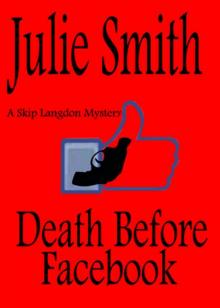 Death Before Facebook (Skip Langdon #4) (Skip Langdon Mystery) (The Skip Langdon Series)
Death Before Facebook (Skip Langdon #4) (Skip Langdon Mystery) (The Skip Langdon Series) P.I. On A Hot Tin Roof
P.I. On A Hot Tin Roof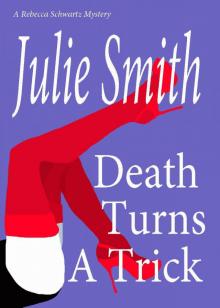 Death Turns A Trick (Rebecca Schwartz #1) (A Rebecca Schwartz Mystery) (The Rebecca Schwartz Series)
Death Turns A Trick (Rebecca Schwartz #1) (A Rebecca Schwartz Mystery) (The Rebecca Schwartz Series)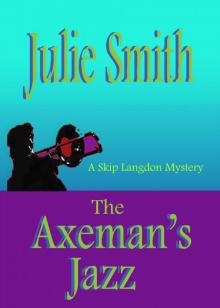 The Axeman's Jazz (Skip Langdon Mystery Series #2) (The Skip Langdon Series)
The Axeman's Jazz (Skip Langdon Mystery Series #2) (The Skip Langdon Series)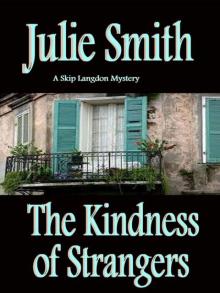 The Kindness of Strangers (Skip Langdon Mystery #6) (The Skip Langdon Series)
The Kindness of Strangers (Skip Langdon Mystery #6) (The Skip Langdon Series)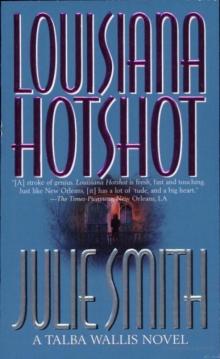 Louisiana Hotshot
Louisiana Hotshot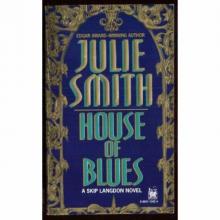 House of Blues
House of Blues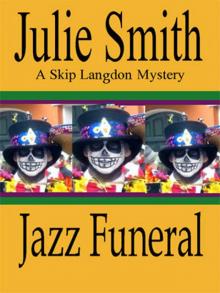 Jazz Funeral (Skip Langdon #3) (Skip Langdon Mystery) (The Skip Langdon Series)
Jazz Funeral (Skip Langdon #3) (Skip Langdon Mystery) (The Skip Langdon Series)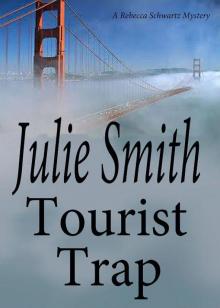 Tourist Trap (Rebecca Schwartz #3) (A Rebecca Schwartz Mystery) (The Rebecca Schwartz Series)
Tourist Trap (Rebecca Schwartz #3) (A Rebecca Schwartz Mystery) (The Rebecca Schwartz Series)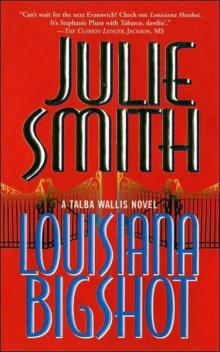 Louisiana Bigshot
Louisiana Bigshot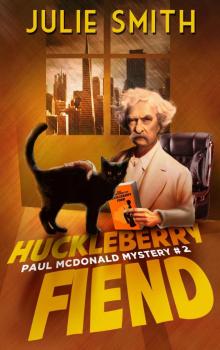 Huckleberry Fiend
Huckleberry Fiend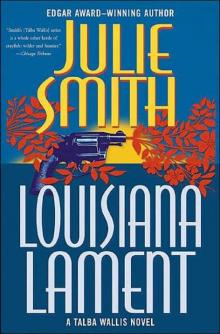 Louisiana Lament
Louisiana Lament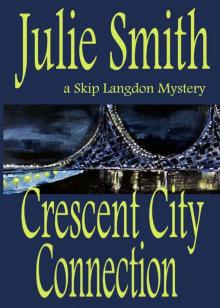 Crescent City Connection (Skip Langdon Mystery #7) (The Skip Langdon Series)
Crescent City Connection (Skip Langdon Mystery #7) (The Skip Langdon Series)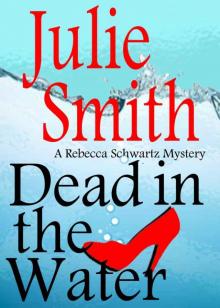 Dead In The Water (Rebecca Schwartz Mystery #4) (The Rebecca Schwartz Series)
Dead In The Water (Rebecca Schwartz Mystery #4) (The Rebecca Schwartz Series)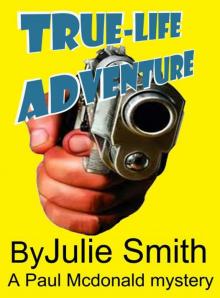 True-Life Adventure
True-Life Adventure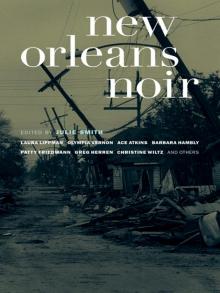 New Orleans Noir
New Orleans Noir